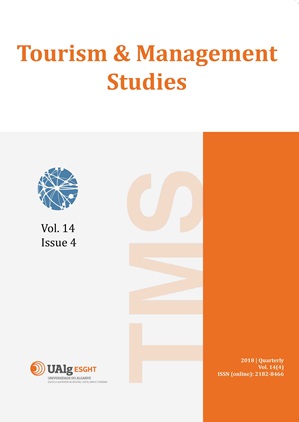Tourism activities and companies in a sustainable adventure tourism destination: the Azores
Keywords:
Tourism activities, tourism companies, adventure tourism, sustainable tourism, AzoresAbstract
The Azores is one of the most sustainable nature-based island destinations in the world. Local tourism activities companies are vital to tourists’ adventure experiences. These businesses’ portfolios were analysed using various editions of the official Tourism Activities Guide. The analysis focused on companies’ products, types of activities, geographical coverage and brands. The generalised profile generated indicates that these firms each operate on only one island, have a small portfolio and are prone to specialise in sea or land activities. Snorkelling and motor boat rides are the most common sea activities, while nature hikes and walks, van tours and cultural tours are the most widely offered land activities. Explicit or indirect references to the Azores and adventure often appear in companies’ brands, which is in line with international trends in adventure tourism. However, company profiles are changing due to the impacts of a new air transport model.
References
Arnegger, J., Woltering, M., & Job, H. (2010). Toward a product-based typology for nature-based tourism: a conceptual framework. Journal of Sustainable Tourism, 18(7), 915-928. doi: 10.1080/09669582.2010.485680
Ayala, H. (1996). Resort Ecotourism: A Paradigm of the 21st Century. Cornell Hotel and Restaurant Administration Quarterly, 37(5), 46-53. doi: 10.1016/0010-8804(96)88974-9
Baldacchino, G. (2006). Warm versus cold water island tourism: A review of policy implications. Island Studies Journal, 1(2), 183-200.
Buckley, R. (2006). Adventure tourism research: a guide to the literature. Tourism Recreation Research, 31(2), 75-83. doi: 10.1080/02508281.2006.11081265
Buckley, R. (2007). Adventure tourism products: price, duration, size, skill, remoteness. Tourism Management, 28(6), 1428-1433. doi: 10.1016/j.tourman.2006.12.003
Buhalis, D. (2000). Marketing the competitive destination of the future. Tourism Management, 21(1), 97-116. doi: 10.1016/S0261-5177(99)00095-3.
Butler, R. (1980). The concept of a tourist area cycle of evolution: Implications for management of resources. Canadian Geographer, 24(1), 5-12. doi: 10.1111/j.1541-0064.1980.tb00970.x
Cole, Z. (2016). Identifying adventure tourism product signatures: a case analysis of guided mountain bike tours. E-Review of Tourism Research (eRTR), 13(3/4), 490-500.
Couto, G., Pimentel, P., & Ponte, J. (2017). Tourism Development Potential in an Insular Territory: The Case of Ribeira Grande in the Azores. Journal of Tourism Research & Hospitality, 6(2). doi: 10.4172/2324-8807.1000166
Giddy, J. (2017). A profile of commercial adventure tourism participants in South Africa. Anatolia: An International Journal of Tourism and Hospitality Research, 1-12.
Goodwin, H. (1996). In pursuit of ecotourism. Biodiversity and Conservation, 5(3), 277-291.
Kozak, M. (1999, September). Destination Competitiveness Measurement: Analysis of Effective Factors and Indicators. Paper presented at the 39th European Regional Science Association Conference. Vienna: European Regional Science Association.
McMinn, S. (1997). The challenge if sustainable tourism. The Environmentalist, 17, 135-141.
Moniz, A. (2009). A Sustentabilidade do Turismo em Ilhas de Pequena Dimensão: O Caso dos Açores. Ponta Delgada: Centro de Estudos de Economia Aplicada do Atlântico – CEEAplA.
Santos, C., Couto, G., Pimentel, P., & Vieira, J. (2012). Quality of the Azores destination in the perspective of tourists. Tourism and Hospitality Research, 12(1), 32-42. doi: 10.1177/1467358411429639
Scarpaci. C., Dayanthi, N., & Corkeron, P. (2003). Compliance with regulations by “swim-with-dolphins” operations in Port Philip Bay, Victoria, Australia. Environmental Management, 31(2), 342-347. doi: 10.1007/s00267-002-2799-z
Silva, F. & Almeida, M. (2013). Sustentabilidade do turismo na natureza nos Açores – O caso do canyoning. Em Almeida, M. (Ed.), Turismo e desporto na natureza, (pp. 5-19), Estoril: Associação de Desportos de Aventura Desnível.
Smith, S. (1994). The tourism product. Annals of Tourism Research, 21(3), 582-595. doi: 10.1016/0160-7383(94)90121-X
Steynberg, L., & Grundling, J. (2005). Sustainability of adventure tourism: The economic highway. Sustainable Development and Planning II, WIT Transactions on Ecology and the Environment, 84(2), 1419-1428. doi: 10.2495/SPD051392
Tshipala, N., Coetzee, W., & Potieter, M. (2014). Stakeholder’s views of sustainable adventure tourism indicators: a cluster analysis methodology. African Journal for Physical, Health Education, Recreation and Dance (AJPHERD), 20(1), 40-51.
UNWTO (2014). Global Report on Adventure Tourism (AM Reports: Volume Nine). Retrieved from UNWTO: http://cf.cdn.unwto.org/sites/all/files/pdf/final_1global_report_on_adventure_tourism.pdf
Vieira, J., Couto, G., Pimentel, P., Menezes, A., Moniz, A., & Sousa, F. (2014). The Satisfaction of the Nordic Tourist with the Azores as a Destination. Scandinavian Journal of Hospitality and Tourism, 13(1), 59-73. doi: 10.1080/15022250.2014.959806
Downloads
Published
Issue
Section
License
Copyright (c) 2019 Tourism & Management Studies

This work is licensed under a Creative Commons Attribution-NoDerivatives 4.0 International License.
The journal retains published articles’ copyrights, but they are simultaneously licensed under the Creative Commons Attribution License (CC BY-NC-ND), which allows individuals’ to share the relevant papers as long as authorship and publication in this journal are duly acknowledged.



